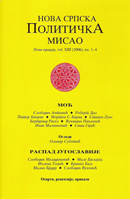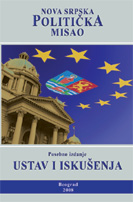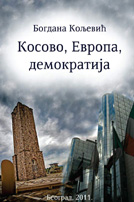| NSPM in English | |||
Kosovo holds its breath as ICJ prepares to rule on independence |
 |
 |
 |
| четвртак, 22. јул 2010. | |
|
(Guardian, 21 July 2010)
The long-awaited ruling on the legality of Kosovo's 2008 declaration of independence will be disclosed by the international court of justice tomorrow. The judgment from the ICJ in The Hague – to be issued at 2pm – is not legally binding, but is likely to have profound consequences for Kosovo and other de facto states and territories that might secede in the future. Formerly the southernmost province of Serbia, Kosovo's ethnic Albanian majority rebelled against rule from Belgrade in 1998 after years of political repression, triggering an intervention by Nato in the conflict that followed. Following the failure of a negotiated settlement between Belgrade and Pristina after the conflict, Kosovo unilaterally declared itself independent in February 2008. It was this declaration that was referred to the ICJ after Serbia complained to the UN general assembly. The judges on the panel – split almost evenly between those from countries that have recognised Kosovo and those that have not – have a history of careful and conservative judgments. Speaking today, the Serbian foreign minister, Vuk Jeremic, warned that even in the event of a ruling against it, Belgrade was not ready to give up its claim to Kosovo. "Serbia will not change its position regarding Kosovo's unilateral declaration of independence and necessity of a compromise. Our fight for such a solution will probably be long and difficult, but we will not give up." Jeremic, who will be in The Hague for the ruling, had said earlier that he expected a decision to vindicate Serbia, which would lead to new negotiations on both sides. But Kosovo's deputy prime minister, Rame Manaj, insisted: "The declaration of independence is legal and legitimate because it expresses the will of Kosovo's people." The court has three options: rule the declaration illegal, rule it legal, or offer an undecided or a balanced view. Key considerations that the court examined, arising out of dozens of submissions by UN member states as well as by Kosovo's own leadership, have focused on issues of sovereignty, the slim volume of precedent in international law, and how formerly large states such as the USSR broke up along administrative borders. While 69 countries have recognised Kosovo's declaration, it remains far short of the two-thirds of the general assembly required for membership of the UN. A ruling in Kosovo's favour could bring that closer, with some countries expected to recognise Kosovo should a ruling go its way. None of the scenarios, however, is expected to have an immediate impact on the situation on the ground, where a small area with a Serb majority has split away itself around the north of the town of Mitrovica, which has about 100,000 residents. The resulting deadlock has sometimes erupted into violence, despite intense international efforts, with Serbs and Kosovans running their own areas. One way out of the impasse, according to one European diplomat who has been closely monitoring the issue, would be if both sides could be persuaded to engage in "technical talks" after the ruling – as opposed to "negotiations" – to discuss a "special status" for Mitrovica North and its surrounding Serb enclave. This idea was floated by western diplomats earlier this month. Under this proposal Belgrade would be the guarantor of the Serb enclave's autonomy, rather than Belgrade and Pristina together, giving it a status similar to the South Tirol in Italy. For Serbia, the ruling could complicate the balance of its awkward politics. A ruling in its favour could lead to an entrenchment of its claims on Kosovo, creating problems for its ambitions for EU membership. A judgment against it is unlikely to change its support for Serbs around Mitrovica. A judgment that the declaration of independence was legal would also have an impact on the wider international stage, bolstering demands for recognition by territories as diverse as Northern Cyprus, Somaliland, Nagorno-Karabakh, South Ossetia, Abkhazia and Transnistria. Among those expecting a ruling largely in Serbia's favour is Dr Stefan Wolff, professor of international security at Birmingham University. "My personal view is that the court will say it is not in accordance with international law. It is likely to take a very narrow view of the arguments." Wolff believes a judgment in favour of Kosovo would make it more difficult for the UN to manage conflicts, especially in the transitional management of disputed territories. James Ker-Lindsay, a Balkans expert at the London School of Economics, is more emphatic: "The legality of Kosovo's unilateral declaration of independence is the most important case ever to come before the international court of justice. "The opinion of the court could radically change the way we treat separatist groups in future. If it finds in favour of Kosovo, the floodgates could be opened for a whole raft of new states to emerge. No one wants to see this happen." |
Од истог аутора
Остали чланци у рубрици
- Playing With Fire in Ukraine
- Kosovo as a res extra commercium and the alchemy of colonization
- The Balkans XX years after NATO aggression: the case of the Republic of Srpska – past, present and future
- Из архиве - Remarks Before the Foreign Affairs Committee of the European Parliament
- Dysfunction in the Balkans - Can the Post-Yugoslav Settlement Survive?
- Serbia’s latest would-be savior is a modernizer, a strongman - or both
- Why the Ukraine Crisis Is the West’s Fault
- The Ghosts of World War I Circle over Ukraine
- Nato's action plan in Ukraine is right out of Dr Strangelove
- Why Yanukovych Said No to Europe

.jpg)








 Serbia not ready to give up its claim to former province ahead of ruling from ICJ on territory's unilateral declaration in 2008
Serbia not ready to give up its claim to former province ahead of ruling from ICJ on territory's unilateral declaration in 2008










